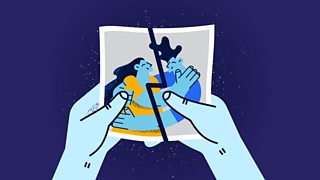Rose Ayling-Ellis on Â鶹ԼÅÄ Radio 4’s Woman’s Hour: Read the full transcript
Rose Ayling-Ellis, star of Strictly and EastEnders, joined Anita Rani on Â鶹ԼÅÄ Radio 4’s Woman’s Hour.
They discussed her West End debut in Shakespeare’s romantic comedy As You Like It at the Soho Place theatre, that iconic Strictly dance and the work she’s doing to make theatre more accessible for deaf audiences.
You can read a full transcript of Rose's interview with Anita below, or you can find the audio from the entire interview on Â鶹ԼÅÄ Sounds.

ANITA: Now, a little bit of stardust in the studio. You may remember the video that went viral in 2021 of Rose Ayling-Ellis and her Strictly Come Dancing partner Giovanni dancing in complete silence during their Couple's Choice dance. Rose is deaf and uses British Sign Language to help her communicate. They wanted to use their dance to show what it's like for the deaf community on a daily basis. She went on to win the show, and won a BAFTA after the dance was voted by the public as the 'Must-See TV Moment' of the year.
She has since successfully campaigned for British Sign Language to be recognised as an official language of the UK, signed a CBeebies bedtime story and helped launch the first ever Barbie doll with behind the ear hearing aids. Now she's back on stage making her West End debut in Shakespeare's romantic comedy As You Like It at the Soho Place theatre. And she joins me now in the studio with her British Sign Language interpreter, Liam. Welcome.
ROSE: Hello.
ANITA: It is wonderful to have you in the studio, Rose. How does it feel to be onstage in Shakespeare making your West End debut?
ROSE: It's really nice because I haven't been in a theatre since before COVID, since before EastEnders. And it made me realise how much I missed it. I love the audience and energy you get from the audience and putting on the show and it's very intimate. It's only 500 people and you're putting on a show for them and making them in involved in your storytelling.
ANITA: Is Shakespeare always something you've wanted to do?
ROSE: Actually, no! At school, Shakespeare was one of the worst subjects. I did not like it at all. I was thinking: 'Why do people write like that? Why? I mean, we've got modern English why do we need to learn all the old language? But it isn't until now that I've started doing rehearsals, where I've realised actually there's so much in the life that we live that's very Shakespeare, the language was evolved from it, the humour and the jokes we get, everything came from it. So, it's such a real history lesson for me.
ANITA: But also you being in Shakespeare, because you are using sign language to express what's being said, actually is making it more accessible for people who may be fear going to see Shakespeare because of the language.
ROSE: Yeah, exactly. I had someone in the audience last night, who's not very into Shakespeare, didn't really watch Shakespeare. But because of the captions and because of the sign language, it made them feel less intimidated by - a bit more acessed and more included. And you can see a lot of humour in the body language of well. So, even if you don't completely understand everything that has been said, you can understand our story.
ANITA: And Celia is funny, the character you play. She brings a lot of light to the show, which is very different to your gritty role in EastEnders. What appealed to you about her character?
ROSE: I feel like she is almost like a deaf character, even though she hasn't been written as deaf. There's a lot of things that I can relate to a lot. Because she has a really close friendship and then she gets left out when her friends fall in love, and that's happened to all of us, I'm sure. And also her bad relationship with her father, the family dynamic.
The language is perfect because with her father she speaks but she's so traumatised by it, that she chooses not to speak. Rather than she can't speak, she chooses not to because she wants to sign. It's her expression, it's her language. Almost you can see she is desparate to just be who she wants to be.
ANITA: You mentioned there one of the themes in the show is friendship and sisterhood between the cousins Rosalind and Celia. Did you draw on your own family or friendships when you were preparing for that role?
ROSE: Luckily, I've got some of the closest female friendship that we stay close. And I think we all have that and I think female friendship is one of the most important things about being a woman I supposed. I mean, this is Woman's Hour so let's talk about women.
ANITA: Oh, yeah, let's bring it on. You're in the right place. Let's do it.
ROSE: Yes. I think sometimes when you fall out with your female friends, it can hurt more than a relationship.
ANITA: It's a heartbreak.
ROSE: It's a heartbreak. It really is.
ANITA: Just how easy or difficult is it to translate Shakespeare into BSL?
ROSE: Oh it's not easy, not easy. A lot of people think with signing, you just sign word by word. Nah, nah, nah. It doesn't work like that. Because if we sign word by word you, kind of, lose the meaning. What does it mean? Because it's Shakespeare, it's very metaphorical, but in sign language it's very literal.
So if with sign, for example, 'it's raining cats and dogs'. That means it's raining heavy. If we do it in sign language, word by word, we will literally be saying there are cats and dogs falling from the ceiling. So we actually have to change it to more like an expression.
ANITA: To paint a picture for our listeners, you use British Sign Language as part of the performance and there are captions because the theatre is in the round. So, there are captions around the stage for everyone to be able to read. Why was it so important? Why were you so passionate to make this an inclusive show?
ROSE: Because I don't go to many West End shows. Because West End shows only have like one captioned show per year, or per the whole run, they only have one. When I do go to watch these captions, they're on the other side of the room, and I'm twisting my neck and I want to watch the actor. I don't want to be...I might as well just print of a script and read it myself.
So with this, I felt like this is a brand new theatre. And I felt like: 'Right, at the first show, let's make it inclusive. Let's set it up.' And because it's round you've got captions all around, and it's also designed to, sort of, integrate into the show, so it's decorated. So it's nice that I can go and watch the show and feel like the caption is part of the show rather than the captions being there because I need my access.
ANITA: Yeah, as an add on. How much a part of the process were you of making sure that it was as inclusive as possible?
ROSE: Yes, so everyone had deaf awareness training. [Josie Rourke], the director, she is wonderful. I didn't feel like I had to fight for anything. I didn't feel like had to ask. I just asked once and it got done. And Josie is really caring about it too and the theatre as well, because it's brand new, they're learning and they want to. It's a modern world that we live in now. Some of theatre is so old it needs to catch up with the times. I can't believe I said that.
ANITA: Say it. You are not shy of talking about things. You're not shy at all. I rewatched your amazing alternative McTaggart speech. Now this is a huge speech that you made to people within the television industry. And you got on that platform and you really spoke some home truths about what it means to be deaf and working as an actor. But you also said that you were torn, because you just want to turn up smile and do the job. But here you are having to push for change as well.
ROSE: Yeah. Doing that speech was probably the hardest thing I've ever done, because it's so honest and so open. And it's the part of me that I don't always share because of the fears that comes with it. But yeah, I feel like sometimes I want to just enjoy the job I do. But a part of me, I can't just fully enjoy it. I still have to make change. But in a way I appreciate, I love being deaf because it's given me a purpose. It's given me something to aim for. But it can be exhausting sometimes.
ANITA: And what are the fears?
ROSE: The fear of speaking the truth and perhaps everyone gets a bit scared of it. People are learning and they don't know about it and that's okay, people are learning for the first time. But they could either go extreme way where they are too scared of offending me that they're avoiding me completely, or don't speak about it or don't want to talk about it. And it's okay to talk about it and make mistakes. That's what I want to say with the fear of losing all my opportunity because no one wants to offend me. See what I mean.
ANITA: No one wants to offend you, or you're the person who's constantly talking about the change. So you can't just turn up and smile and do the job?
ROSE: No, I can't just turn up and talk about: 'Oh, look this is what I'm doing. I'm doing acting, oh just this stuff. It's almost like I am political without asking to be political.
ANITA: You've got no choice.
ROSE: No. I've got no choice. But that's okay. I mean, who else is doing it?
ANITA: Yeah. Well, there's just you. Is that a big burden?
ROSE: Yeah. Yeah, it can be hard sometimes. It can be exciting as well, because when it goes right, yes! But when it doesn't, it feels like fighting. Sometimes I actually feel likey: 'You know what, I can't be bothered.'
ANITA: So, when that happens, when you do feel like you can't be bothered, who supports you? Who have you got around you to really pick you up and say: 'We've got you'?
ROSE: I think my family. My family, my friends, my interpreter, my deaf friends. They do pick me up. And especially deaf people, I think, because you can talk about it with them without explaining to them. They just get what it is. Or sometimes I just like to just watch a good film with subtitles and just watch a film, or read my book, or paint a picture. You know, it's important to do that,
ANITA: Or go to a concert?
ROSE: Or a concert and dance.
ANITA: Yeah. I read somewhere that friends of yours when you were younger, couldn't understand why you would go to a concert because they didn't understand how a deaf person would experience a concert.
ROSE: Yeah, I go to Latitude festival and I went every single year for many, many years and I love it. It's just that atmosphere and vibe. And we have interpreters there and a sound system. I can hear the music, but I don't know what they're saying. So sometimes when the lyrics are signed, I'm like: 'Ah, this is the song.' ...Why not? I like to go to festivals.
ANITA: Of course. Absolutely. And I know we've talked about the kind of the burden and the pressure of having to speak out about your experience, but also, we've got to recognise the changes you have made and how beautifully you have done it. I started the programme by talking about that game changing moment of watching you dance with Giovanni Pernice on Strictly. You must have had a huge reaction to that?
ROSE: Yes. It's funny, because when I was in Strictly and doing the dance, I didn't really see it because you're so in the bubble, you're focused on the new dance. Right, you've got to dance every week. And it wasn't until I left Strictly and then the whole BAFTA thing and it wasn't until after that it really sunk in: Oh, wow.
And people still talk about it. And it's a funny one because I never really planned for this much of a change. And it happened and I'm so happy that it happened in this way. But there's still a lot of work to be done. I mean, it was so positive. But that's why I'm going to do the documentary at the moment.
ANITA: Tell me about that. What's the documentary, [Signs For Change]?
ROSE: So the documentary, we haven't planned anything but it's basically putting me on a journey to, sort of, discover what needs to be changed and what support deaf people should get nowadays. We're still working on it, and we're filming it at the same time as doing the theatre. So, I think it's good to see all the positives but it's good to have a balance to see all the realities.
ANITA: Do you have the option to say no to things?
ROSE: Only just recently now, yes. I mean, before Strictly I always said yes to everything because I don't get that many opportunities. I say yes whenever I can. But now, I got given so much stuff, for the first time I'm saying no and it feels awful.
ANITA: You feel awful? Do you not feel powerful?
ROSE: That's what my agent says: 'It's good to say no because it's good to show what kind of path I want to go on.' I just want to do everything. But, I understand how important it is to say no. And I'm learning how to say no. And I think that comes with age, I think. I think, 27 now and I'm turning 28. I am saying no to things. I've got my boundaries and I like it.
ANITA: Yeah more power to you.
ROSE: Yeah!
ANITA: And you're only 28, I love how you say it comes with age. You're only 28. You have such a long way to go yet. But also I know it's really important for you to create opportunities because like I said, it's just you at the minute. You're a lone voice. But you want to change that.
ROSE: Yeah.
ANITA: And telling stories is really important to you. Aren't you working on a series or are you writing something?
ROSE: Yeah. So, because there's not many acting roles that is deaf, so we have to start writing it. And I want to have more than one deaf character in it. The thing is, I always believe I like to build the ladder, climbed it, but I don't want to take the ladder with me. I want to leave it behind for other deaf people to climb up too.
So, I feel like: 'Right this is the opportunity for me.' I'm not very good at writing. But I've got a co-writer. So I've got a writer who is amazing, she's going to write it and then we're going to sit in a room together with different people and have their experience shared because I've always been talking about how it should be deaf people talking about their experience. I want to sort of use it as demonstration for my comedy series.
ANITA: Oh yeah, we can't wait. Cannot wait.
ROSE: Might be a long time though.
ANITA: Well, you never know. Come back and talk to us about it. And you dance in the play?
ROSE: Do I dance in this play?
ANITA: Yeah?
ROSE: Well, Celia is not a ballroom dancer. So I have to dance how the character dances. So it's not particularly beautiful dancing.
ANITA: But how did it feel to be onstage dancing again?
ROSE: It's feels good. Let's party. It's actually quite nice because I don't have to worry about right finish for foot, point my finger, do all of this. I don't have Giovanni telling me: 'Do this. Do this. Do this.' I can just jump up and down and do it really badly and not be told off anymore.
ANITA: As someone who has gone through Strictly, it's so magical, but it is hard work.
ROSE: It is hard. The body hurts.
ANITA: It's so hard. But you made it look easy. That's the stuff they don't tell you about: how much your body hurts. But you made it look so effortless and so elegant. Have you been able to watch it back?
ROSE: Yes, it's only lately I started to watch back. But I really missed it. I really want to dance like that again. Because it's come with so much training. We'd be training eight hours every single day to get to that point. But now, even just me standing in a ballroom position. I get out of breath. What about you?
ANITA: I mean, I think you're taught to dance like that, aren't you? I mean, I'd rather just just dance at any given opportunity, just move around. But I was not a patch on you. You were absolutely amazing. Rose, it's been such a pleasure talking to you. Thank you so much. I can't wait to see what you do next. Good luck with the rest of the production. Have an amazing Christmas.
ROSE: And thank you for having me.
ANITA: Oh, anytime. You're welcome any time. We'll put the kettle on, get the biscuits in next time.
ROSE: Get the biscuits!
This transcript was taken from Rose Ayling-Ellis' interview with Anita Rani on Â鶹ԼÅÄ Radio 4's Woman's Hour on 9 December 2022. You can find the full interview on Â鶹ԼÅÄ Sounds.




